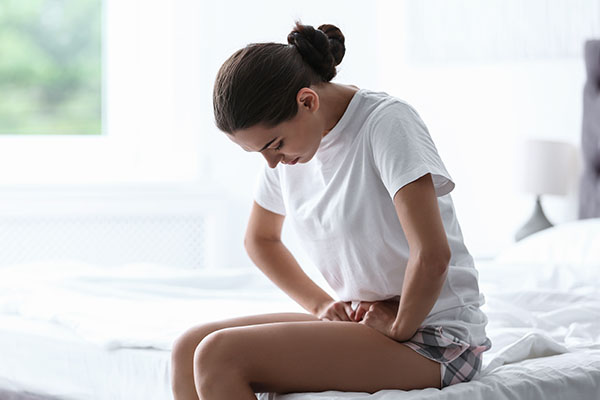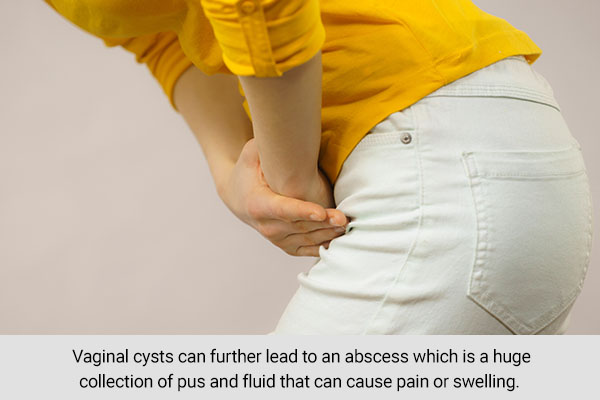In this article:
Cysts are bumps on the body that are filled with fluid or air. In simple words, experts define cysts as sacs or pockets of tissue that are closed and may be filled with air, pus, fluid, or some other material.

Cysts can form anywhere in the body. The good news is that these cysts are mainly benign or noncancerous. Sometimes, cysts are so small that you can’t even see them with your naked eye. They are also not very harmful or cause a lot of pain, but they can grow and become huge in size.
Cysts can develop on any part of the body including the vagina and are usually observed on the vagina lining or under it. A cyst can often become uncomfortable if it gets infected or increases in size, for which you may want to get some relief. (1)
What Are the Different Types of Vaginal Cysts?
The most common type of vaginal cyst is inclusion cysts, which are very small and are found in the lower back area of the vaginal wall. Other types of vaginal cyst include fluid-filled cyst that is observed on the opening of the vagina.
Bartholin cysts are formed when a woman is pregnant and the ducts from the embryo do not disappear after the birth of the child. Another common type of vaginal cyst contains mucus and is found on the vaginal wall. This is also observed mainly after pregnancy. (2)
What Causes Vaginal Cysts?
Vaginal cysts occur when the gland or duct around the vagina gets clogged and the material inside it accumulates. Cysts can also develop when the vaginal walls face trauma.
Childbirth can also contribute to cyst formation, especially when a surgical incision is made to the vagina. Anything that can damage the vaginal lining can lead to cysts. Bacterial infection and sexually transmitted diseases are also known to promote vaginal cysts. (1)
What Are the Common Symptoms of Vaginal Cysts?

Vaginal cysts do not always come with symptoms. You can usually feel them as bumps on the vaginal wall and can come be discovered during a routine checkup with your gynecologist.
They are also not very painful; thus, you might not know about them until later. However, if they are larger, they can be very uncomfortable to deal with, especially when you walk or during sexual intercourse. (1)
Vaginal cysts are very common. Data shows that 1 in 200 women may suffer from vaginal cysts, but this number is lower than the actual one as most vaginal cysts are left unreported. (3)
How to Treat Vaginal Cysts?
Vaginal cysts often are very small and resolve by themselves without causing major health issues, which is why you don’t need to treat them.
The cysts can be monitored during a routine checkup to make sure they’re not growing in size. Monitoring is the most critical part of vaginal cyst management and care. A biopsy can be done to make sure that the cyst is not cancerous.
If you experience some discomfort from vaginal cysts, you can try some remedies or over-the-counter medication for symptomatic relief. However, in the case of infected vaginal cysts, you may need prescription antibiotics. (1)
Diagnosing Vaginal Cysts
Vaginal cysts are usually diagnosed when you go for a routine checkup with your doctor. You may get to know about the existence of vaginal cysts while getting a routine pelvic exam. The cysts can be diagnosed via physical exam.
This means that a bulge observed during a routine exam may indicate a vaginal cyst. To confirm that it’s a cyst, it’s important to slash away other possibilities such as cancer after a biopsy.
If the cysts are located somewhere under the bladder or your urethra, then a physical exam may not be enough and you’d require an X-ray to see the cysts. (4)
Your healthcare expert may also advise you to undergo an ultrasound to obtain a clearer view of the cysts.
Complications or Risks of Vaginal Cysts

Experts share that the most possible risk that may arise from vaginal cysts is an infection that can further lead to an abscess, which is a huge collection of pus and fluid that can cause pain or swelling.
How Is a Cyst Different From a Tumor?
An important aspect of learning about cysts is to know how they’re different from tumors. A cyst is a sac that can be filled with air, fluid, or other material and can be found in any body part, even bones, organs, and soft tissues.
Most of these cysts are benign and do not cause cancer; however, sometimes cancer may lead to the formation of a cyst.
A tumor, on the other hand, is an abnormal growth or mass of tissue or swelling. Like a cyst, a tumor can also form in any part of the body but it can be cancerous or malignant.
When to See a Doctor
Make sure not to rely on home treatments and seek professional help if you observe the following:

- Severe pain in the vagina
- Fever
- No improvement in your condition
- Recurrence of cysts after treatment
- Cysts becoming large or painful
- Pus, redness, or swelling in the cyst
Final Word
Vaginal cysts are basically pockets of air or pus in your vaginal lining. They can be of different types and sizes and do not usually come with symptoms.
If they become infected, they can be very painful and cause swelling and require proper management. Having proper knowledge about such problems is important for every woman in order to lead a healthy life with the least possible discomfort and also to avoid any complications in the future.
 Continue Reading6 Home Remedies to Manage Vaginal Cysts
Continue Reading6 Home Remedies to Manage Vaginal Cysts
- Was this article helpful?
- YES, THANKS!NOT REALLY


